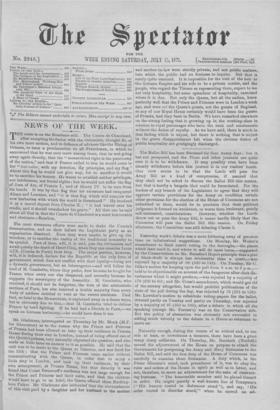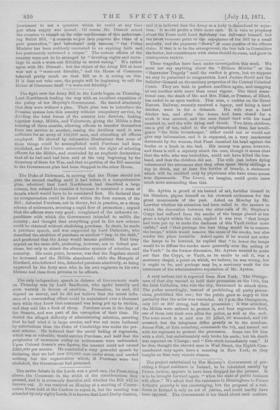Naturally enough, during the course of so critical and, to
one side at least, so unwelcome a measure, there have been a great many sharp collisions. On Thursday, Mr. Bentinck (Norfolk) moved the adjournment of the House on purpose to attack the Government for postponing the Army and Navy Estimates to the Ballot Bill, and said the first duty of the House of Commons was carefully to examine these Estimates. A duty which, in the Prime Minister's mind, took precedence of it, was to obey the rules and orders of the House in spirit as well as in letter, and not, therefore, to move an adjournment for the sake of obstruct- ing business. " The honourable member said ho placed himself in order. He might parody a well-known line of Tennyson's (" His honour rooted in dishonour stood "), and say, His order rooted in disorder stood," when he moved an ad- journment to ask a question which ho could at any time put when supply was moved. Of course Mr. Disraeli seized the occasion to remark on the utter needlessness of this embarrass- ing Ballot Bill, " a measure to put into practice the ideas of a past generation," and introduced only because " the Prime Minister has been suddenly converted to an expiriog faith and has passionately embraced a corpse." The serious affairs of the country were not to be arranged by " devoting nights and morn- ings to such a worn-out frivolity as secret voting." We rather agree with Mr. Disraeli ; but the object of the Army Bill at least was not a " worn-out frivolity," and the House of Commons behaved pretty much on that Bill as it is acting on this. If it does not take care, the people will be beginning to call the House of Commons itself " a worn-out frivolity."































